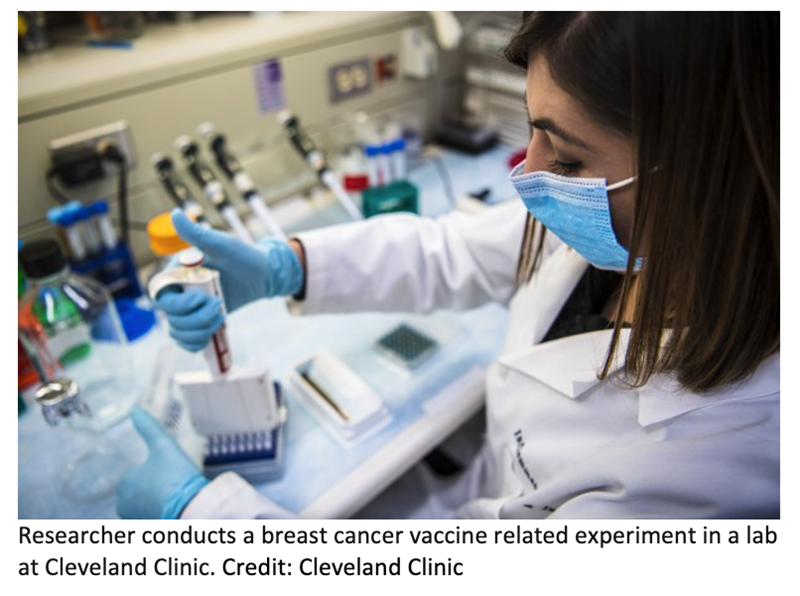Positive Data for Phase 1 Study of Breast Cancer Vaccine Reported
 According to Anixa Biosciences, Inc., the Cleveland Clinic presented the most up-to-date data from the Phase 1 Trial of its breast cancer vaccine, showing that in the vaccinated women who have been tested to date, various levels of antigen-specific T cell responses were observed at all dose levels. The presentation was made by G. Thomas Budd, MD, of Cleveland Clinic's Taussig Cancer Institute and principal investigator of the study. This breast cancer vaccine technology was invented at Cleveland Clinic, where the trial is being conducted, and Anixa is the exclusive worldwide licensee. The trial is funded by a grant from the US Department of Defense to Cleveland Clinic.
According to Anixa Biosciences, Inc., the Cleveland Clinic presented the most up-to-date data from the Phase 1 Trial of its breast cancer vaccine, showing that in the vaccinated women who have been tested to date, various levels of antigen-specific T cell responses were observed at all dose levels. The presentation was made by G. Thomas Budd, MD, of Cleveland Clinic's Taussig Cancer Institute and principal investigator of the study. This breast cancer vaccine technology was invented at Cleveland Clinic, where the trial is being conducted, and Anixa is the exclusive worldwide licensee. The trial is funded by a grant from the US Department of Defense to Cleveland Clinic.
The Phase 1a study is designed to evaluate the safety of the vaccine, identify the Maximum Tolerated Dose (MTD), and monitor the immune response in vaccinated women. All participants in the Phase 1a study are women who have had triple negative breast cancer (TNBC) within the last three years and have been curatively treated having undergone standard of care. At the time of vaccination, these participants are tumor-free, as determined by standard diagnostic techniques, but are at high risk of recurrence.
"We are testing this vaccine to determine if a vaccinated patient's immune system is trained to destroy cancer cells expressing α-lactalbumin, a protein found on TNBC cancer cells and not on normal cells. To evaluate the vaccination effect, immune mediated biomarkers of T cell activation and antibody production specific against α-lactalbumin are measured. We are heartened by the data, and look forward to additional studies," stated Dr Amit Kumar, Chairman and CEO of Anixa Biosciences.
"We are pleased that varying degrees of antigen-specific T cell responses were observed at all dose levels tested to date, however, the Phase 1 trial is not designed to determine whether the responses are sufficient to prevent recurrence or primary tumorogenesis, said Dr Budd. "We expect successive studies to determine how effective the immune responses are in preventing cancer."
Anixa's breast cancer vaccine takes advantage of endogenously produced proteins that have a function at certain times in life, but then become"retired" and disappear from the body. One such protein is a breast-specific lactation protein, α-lactalbumin, which is no longer found post-lactation in normal, aging tissues, but is present in the majority of triple-negative breast cancers. Activating the immune system against this "retired" protein provides preemptive immune protection against emerging breast tumors that express α-lactalbumin. The vaccine also contains an adjuvant that activates an innate immune response, which allows the immune system to mount a response against emerging tumors to prevent them from growing. This vaccine technology was invented by the late Dr Vincent Tuohy, who was the Mort and Iris November Distinguished Chair in Innovative Breast Cancer Research in the Department of Inflammation and Immunity at Cleveland Clinic's Lerner Research Institute. Dr Tuohy was inventor of the technology, which Cleveland Clinic exclusively licensed to Anixa Biosciences.